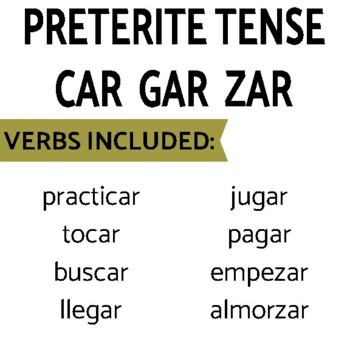
These change from a z sound to a c sound. The Spanish -zar verbs are a bit rarer than the -car ones but the most famous ones would be almorzar “to eat lunch”, comenzar / empezar “to begin”, alcanzar “to reach” etc. The King ordered that they kneel.Įl Rey manda que se hinquen de rodillas. If they’d classified it as a serious disease, he wouldn’t have suffered so much.Įl Rey mandó que se hincaran de rodillas. Si ellos lo clasificaran como una enfermedad seria, no habría sufrido tanto. My mother sings while she plays the piano. Mi madre canta mientras que toque el piano.
So to preserve the hard -car sound it needs to turn to qu. The same thing with subjunctive which says that -ar verbs that are NOT irregular go to -e. You need to use “qué” which sounds like “kay”. Because if you want it to sound like “bus-KAY” which sounds more like buscar…. So it needs to change for the sake of pronunciation. So if you wrote it as “Buscé” it would be pronounced “bu-SAY”. Because when a c is followed by an e it makes a “s” sound like how conoce is pronounced “cono-say”. Buscar is not irregular, therefore it follows that -ar verbs end with an -é in the yo form. If you’re like me you thought: Why? Well, it goes for pronunciation. The -car verbs are very common and it’s hard to think of the “most used” -car verbs but I’d say practicar “to practice”, tocar “to play a musical instrument / to touch” and buscar “to look for”.īut there are also other -car verbs like aplacar “to placate”, aparcar "to park", empacar “to pack”, clasificar "to classify", hincar “to thrust (and sometimes kneel)”, ahorcarse “to be hanged (as in death penalty)" etc. The -car, -zar, -gar, -guar and -cer/cir verbs aren’t the only orthographic ones since there are verbs like construir “to build”, destruir “to destroy”, huir “to flee” and traer “to bring” which are also orhographic verbs but they tend to be strange in many different tenses. 
In general, these changes happen to preserve pronunciation and officially are known as the “orthographic changing verbs” which is a fancy way of saying “they change because they’d sound really weird if they didn’t”.

*-cer/-cir verbs change in the imperative and present subjunctive but NOT IN THE YO FORM OF PRETERITE

These are verbs ending in -car, -zar, -gar and -guar. In Spanish certain verbs have different endings in the imperative and present subjunctive (and sometimes also the yo form in preterite) and you’ve probably wondered why they change. You’ve probably scratched your head at these verbs because they are so changeable in the imperative and present subjunctive and I’m here to hopefully give clarity to why they’re strange.







 0 kommentar(er)
0 kommentar(er)
